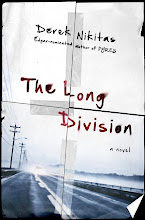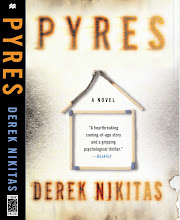...with more to come...
The New York Times Book Review:
With The Long Division, Derek Nikitas bumps up the style requirements for writing crime fiction another notch. When Jodie Larkin steals $5,000 from a home she cleans for an Atlanta housekeeping service and takes off in a stolen car to reconcile with the son she abandoned 15 years earlier, she sets in motion a chain of events that will eventually unite a group of strangers in grief. That takes some dazzling plot maneuvers, but Nikitas interlocks his fragmented story pieces in a way that makes everything seem inevitable - even the murders.
***
The Onion (A.V. Club)
Though ostensibly a crime novel—complete with shootouts, plot twists, and recriminations—Derek Nikitas’ The Long Division is more a work of literary fiction than a genre exercise. Nikitas shows an interest in language and form that outpaces most other authors who write about murder, and it manifests in passages that express the characters’ internal lives in terms of what they see around them. The Long Division is never hard to follow—and it’s peppered with memorable descriptions...
... The Long Division is much better—superior, even—when Nikitas is getting inside each character’s paranoia, exploring how varying degrees of guilt lead them to believe that everyone can see how pathetic they are. That core of emotional understanding is what makes Nikitas a special kind of crime writer.
***
The Atlanta Journal-Constitution:
[The Long Division] is no James Patterson/Faye Kellerman/Dan Brown whodunit. This is a novel concerned with bigger questions of identity, forgiveness, sin and fate.... Not one of the central characters in "Division" is a bad person, and so we keep hoping they will find a way out.But Nikitas tightens the noose, then tightens some more....
[Readers] may also find that the book reminds them a little of a David Lynch movie, or Darren Aronofsky's "Pi"....
[Readers] will certainly find themselves thinking of Lewis Carroll's " Alice in Wonderland." In the book's final moments....Nikitas conjures another writer, the great William Shakespeare, who never let his tragic heroes escape their mistakes, even when their intentions were good.
***
The Charlotte Observer:
The first chapter of "The Long Division" had me e-mailing to ask the publisher for a copy of Derek Nikitas' first novel, "Pyres," which I'm about halfway through now. Both are wonderfully character-driven stories of lives gone off the rails, with special attention to teens trying to make sense of the strange world their parents have twisted like a balloon animal before handing over to them.
***
South Florida Sun-Sentinel:
In his second novel, Derek Nikitas proves that he doesn't write conventional crime fiction; nor does he write conventionally. [The Long Division] has a frenetic pacing that never lets up. Sentences break off in the middle, sometimes even in the middle of a word. Chapters skid from one character to the other. Far from being precious, this gimmick works in a cinematic way, as if The Long Division is the literary complement to Quentin Tarantino in his Reservoir Dogs/Pulp Fiction days, but with far less violence....
The author makes us care about each of these sad, lonely people who seem unable to help themselves. As Nikitas pulls these characters together, surprises pop up on the route to a finale that is heartbreaking.
***
Wilmington Star News:
Clyde Edgerton likes to quote the adage that Evil is boring; it’s Sin that’s really interesting. What makes otherwise good, well-meaning people take a detour, turn left instead of right and veer off on a path that leads to destruction? That might be the theme of “The Long Division....”
Few of the protagonists in this equation are truly evil, but, when they come together, the result is a wreck of bloody and epic proportions....
Don’t pick up this book, though, expecting another James Patterson or even a Jim Thompson. Nikitas writes in a modified stream-of-consciousness, and his characters – especially the brilliant but troubled Wynn – tend to telegraph their thoughts in a language that’s more poetry slam than standard English....
In other words, “The Long Division” is not a beach read. It’s more like introductory calculus. Those readers willing to put forth a little effort, though, will be rewarded for their pains.
***
Publishers Weekly *starred review*:
"Beautifully realized characterizations power complex story lines that meet and connect this disparate group with the inevitability of Greek tragedy."
***
Library Journal *starred review*:
Nikitas is a master craftsman of both plot and prose, merging gritty, evocative description with sharply drawn characters in a staccato style"
***
Kirkus Reviews:
"An elegantly written second novel"




